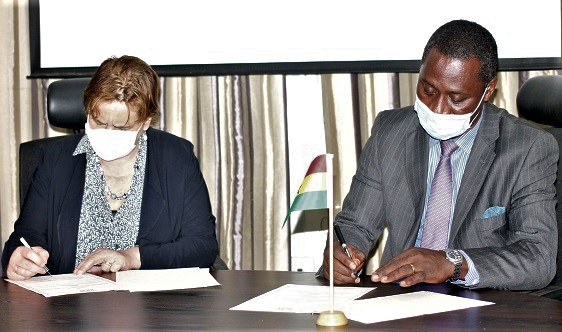The government on March 24, 2022, held a novelle political consultation with the government of the Netherlands to strengthen trade and economic cooperation between the two countries.
The consultations, held at the Ministry of Foreign Affairs and Regional Integration behind closed doors, centred on Defence and Security; Migration and Development; Trade and Investment and Agriculture.
Other areas that featured in the deliberations included Science and Technology; Environment and Climate Change; Education, Culture and Training; and Cooperation in the United Nations (UN) System.
The two countries also signed a Memorandum of Understanding on political consultations.
Trade relations
The Chief Director of the Ministry, Ramses Joseph Cleland, said it was gratifying that in spite of the COVID-19 pandemic, delegations of both countries had convened in person for the first edition of the consultations.
"I am hopeful that as the world continues to find solutions to the effects of the pandemic, coupled with the increase in vaccinations, economies will fully open up for life to return to normal," he said.
He noted that Ghana and the Netherlands had maintained diplomatic relations since 1701, which had enabled the two countries to develop a common history and interconnecting cultures, resulting in shared values.
Over the years, Mr Cleland said the cooperation between the two countries had traversed different sectors, including trade and investment.
"Ghana’s exports to the Netherlands are predominantly primary and semi-finished goods, which include Cocoa beans, Cocoa butter, Cocoa paste, Crude Petroleum, Cocoa Powder, among others. Whereas imports from the Netherlands include Refined Petroleum, Poultry meat, Excavation Machinery and Packaged Medicaments, among others," he said.
He added that Ghana recorded favourable balance of trade from 2016 to 2019 with a trade surplus of $406 million in 2018.
"This favourable position could be attributed to the increase in the export of Ghana’s Crude Oil to the Netherlands. In 2019, Ghana recorded a positive trade balance of $734.8 million dollars with estimated exports of $966.3 million dollars to the Netherlands.
" This figure however decreased to $759.7 million dollars in 2020, whilst the Netherlands exports to Ghana increased from $231.5 million dollars in 2019 to $876.5 million dollars in 2020, recording a surplus of $116.8 million dollars," he said.
Mr Cleland explained that the success in trade was on the back of a joint Ghana-Netherlands Business and Culture Council (GNBCC) that was established in 2003 to stimulate trade and investment between the two countries and fosters mutual cultural understanding.
The GNBCC has a membership of more than one hundred members and offers its services along four main lines; Business Development, Services Business Support Services, Trade Mission and Event Services And Travel Support Services.
Mutual
He said the Netherlands supported Ghana’s economic development through private sector instruments such as the Dutch Good Growth Fund (DGGF), the Development-Related Infrastructure Investment Vehicle (DRIVE), the Netherlands Senior Experts Programme (PUM), Public-Private Partnerships (PPP), the Matchmaking Facility for Developing Countries and the Centre for the Promotion of Imports from Developing Countries (CBI).
"The Ghana-Netherlands bilateral cooperation concentrates on sectors of mutual interest, selected on the basis of the interest of the Dutch private sector and on relevance for the development of Ghana," he said.
He explained that within the framework, the Dutch government had selected sectors such as water, health and agriculture, where Dutch companies have a lot to offer in terms of technology, knowledge, market access and a strong position on the world market.
The Deputy Director/Sub-Sahara Africa Department of The Netherlands, Martine Hoogstraten said such consultations between the two countries must be held periodically to deepen the relationship between the two countries.
"For the Netherlands, I want to stress that we want to play our role in the EU to ensure that the EU is strong and we can work with you in the framework of the EU," she said.
She said the delegation was happy to know that there was room for Dutch businesses to operate in the Ghanaian market.

